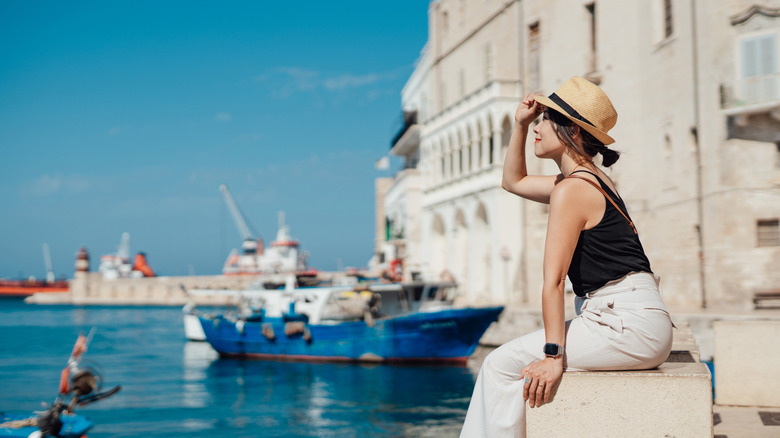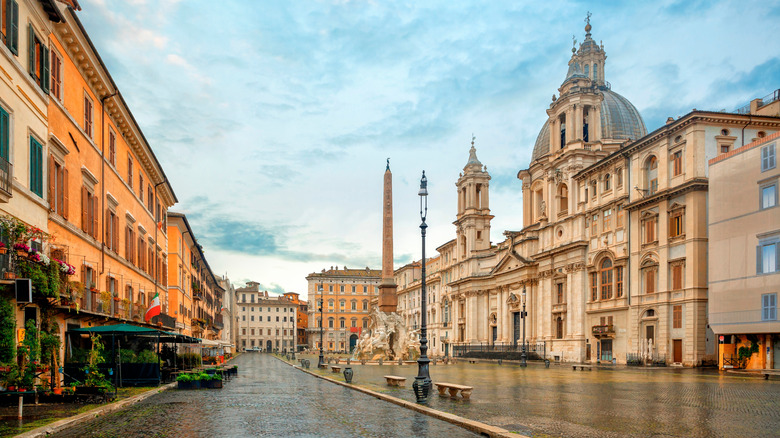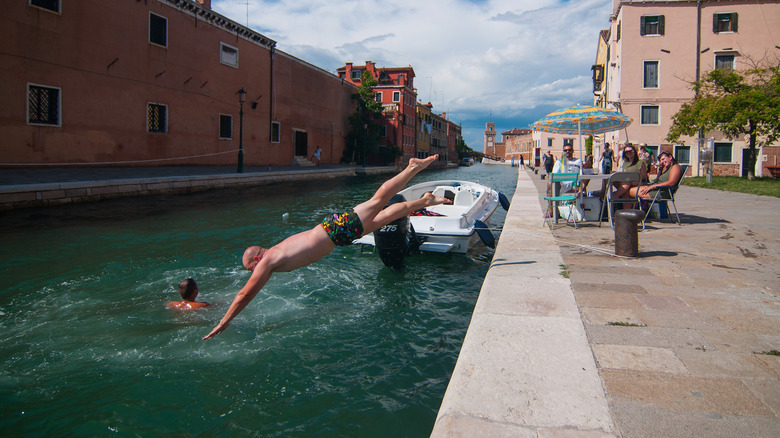Avoid These Common Tourist Offenses In Italy Or You'll Face Hefty Fines
For many travelers, there are tons of amazing bucket list destinations in Italy, with delicious Italian cuisine, rich architectural history, and glittering blue coastlines that manage to attract people from all over the world. Italy has seen a record-breaking rise in tourism over the past few years as travel has become more accessible. While economically, a rise in tourism generally is good, it seems as though Italians are reaching their breaking point with tactless tourist behavior. Overtourism has caused bigger crowds and thus more disruptions to the locals and major landmarks in Italy.
In an effort to crack down on disrespectful tourist behaviors, several cities across Italy have implemented explicit rules that will result in fines or bans for those who dare to test the waters. While some of these rules seem strict, they are ultimately an attempt to preserve the stunning Italian cities for years to come. If you are planning a trip to Italy, be sure to brush up on these fine-inducing missteps to make sure you remain a respectful tourist — and so you can save your euros for gelato.
Keep the streets of Italy clean and clear
Littering should be off limits no matter where you are, but leaving trash behind in Italy could seriously cost you. Dumping trash in public areas of Venice can cost you over $400, while tossing trash from a car window anywhere in Italy could cost you up to $22,000. And don't think you can get away with it, the police don't even have to be present to fine you. A photo that includes the license plate number is enough to send you the bill. (And don't forget about the administrative fees your rental company will charge for the inconvenience.) Making sure your trash finds its way into a trash can is one of the easiest ways to help keep Italian cities clean and avoid significant unplanned trip expenses.
In addition to the no-littering policy, you will want to be mindful of where you can and cannot eat. While navigating Italy's dining culture can be tricky as an outsider, one rule is clear: Don't eat in walkways, near monuments, along bridges, or on the ground in Venice. Stopping in the middle of busy areas to sit and eat can disrupt traffic and leave a mess behind if you're not careful. I mean, you wouldn't want someone to step on your pizza, would you? This is especially important to follow during overcrowded summer tourist months, as there is more opportunity for chaos with thousands of people on the street. And the $230 fine isn't worth it. When in Rome (or at least Venice), save your eating and drinking for restaurants rather than next to landmarks or tourist attractions.
Wear appropriate clothes
Many countries have unspoken rules about what clothes are deemed appropriate to wear, and if you break these rules, the worst you'll get is some raised eyebrows or a bit of side eye. However, in Italy, these rules are explicitly stated and can result in fines if tourists are not dressed appropriately. In cities like Sorrento and Venice, you are not allowed to wear swimsuits or be bare-chested within city limits. If you plan to visit the beach and the city the same day, plan to bring a swimsuit cover-up or a change of clothes or risk a $300 to $600 fine.
These restrictions extend to footwear when it comes to hiking the stunning seaside trails in Cinque Terre. Visitors need to follow Italy's unexpected shoe rule and avoid open-toed styles like flip flops or sandals. This is to keep hikers safe from stray rocks or hazards and to reduce the number of injury-related rescues. If you plan to hike around Cinque Terre, be sure to bring along a good pair of sneakers or hiking shoes to ensure you don't have to fork over the $60-$3,000 fine for letting your toes out on the trail.
Do not disrupt the cities
In Italy, you will want to save your swimming for the beach. Swimming in the Venice canals is strictly forbidden, and can result in a $400 fine and a ban on visiting the area. Frankly, it's also unsafe. Not only is there a chance for you to get bonked by one of the many gondolas passing through, but the water sometimes contains sewage runoff, not something you want to come into contact with. Similarly, in the capital, it could cost you $600 to take a dip in the ornate basin of Rome's Trevi Fountain, and even a lifetime ban for repeat offenders.
Getting lost in the city of Venice should bring about feelings of serenity and wonder, which is why Venetian police strictly enforce fines against those who insist on disturbing the peace. All of these offences can cause disturbances among locals, tourists, and pigeons alike. Refrain from feeding local birds, as you could endanger them by feeding them something unknowingly toxic. There is also no biking through Venice. The streets are narrow and busy, and you don't want to end up with your bike at the bottom of a canal — or with a $100 fine. This includes walking the bike through the city. If you want to survive a trip to Italy without any fines, being mindful and respectful of the local restrictions is a good way to go. Here's why you should also avoid bringing fake luxury items to Europe.



